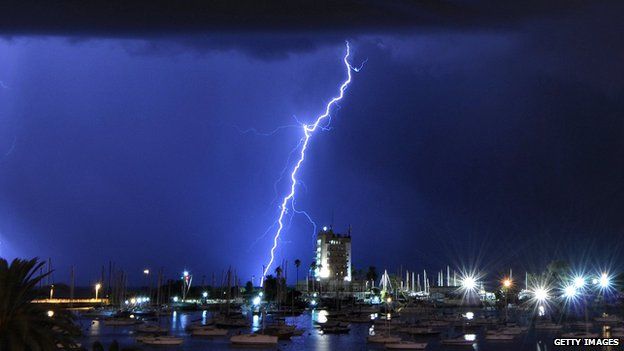Small Data: What are the chances of being hit by lightning?
- Published

Being killed by lightning is extremely unlikely, which is a good thing.
Apparently, the chances are 300,000 to one, according to David Hand in his new book: The Improbability Principle. But while 300,000 to one looks like a minor risk for an individual, there are lots of people on the planet.
As a result, about 24,000 people are killed by lightning each year. Remember, you don't have to be struck by lightning to be killed by it - you could be in a house that's struck by lightning and burns down with you inside. Indeed, with seven billion people on the planet, what would be really, really unlikely would be that nobody was killed by lightning.
Of course, 300,000 to one is an average - people in the developing world who spend less time indoors and have fewer tall buildings and more flammable ones are much more likely to be killed by lightning than people in developed ones.
On average, three people are killed each year by lightning in the UK, according to the Royal Society for the Prevention of Accidents, which are odds 66 times shorter than the global average.
Hand's book sets out to explain why things that are considered to be very unlikely keep on happening. It's not just that people win the lottery. Again, while that's unlikely for an individual, it's pretty likely that someone will win it each week. No, we're talking about really unlikely things, like the lottery drawing the same numbers in two consecutive weeks, as happened on the Bulgarian Lottery in 2009.
So, if you wait around long enough, it looks like you'll get to see almost anything happen. But not a man being struck by lightning twice in succession, seen on a security camera. The video of that, which Hand showed as part of a talk to the Royal Statistical Society on Thursday, is widely described on the internet as having been a fake.
Maybe we'll have to wait a bit longer to see that.
Follow @BBCNewsMagazine on Twitter and on Facebook